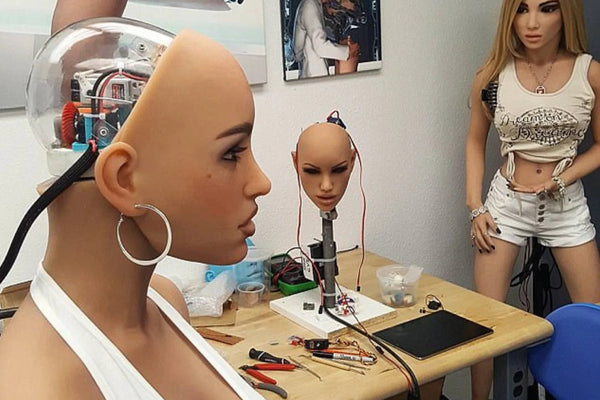Is the growing popularity of AI sex robots a cause for concern?

If someone told you that a walking, talking robot could soon be living in your home, your initial reaction may not be to consider the psychological and security implications but, the growing popularity of AI sex robots is causing some people to do just that according to reports.
It has been suggested that due to the impact of Covid-19 lockdowns and social distancing, more and more people are considering making an investment in a sex doll empowered with AI capabilities. The AI capability means that the doll can talk, allowing for human conversation and a sense of connection during what is otherwise a very isolating experience.
Humanoid robots are no longer the stuff of science fiction
With costs as high as $12,000 (£8,972 / €10,833), a sex robot with artificial intelligence is no small investment but sales have soared during the pandemic.
An AI sex robot differs from a normal sex doll in that it is able to speak and can move its head. Other body parts remain static, as with a standard doll, though it is highly likely that this could change as technology continues to advance. One day in the near future, it is easy to imagine that sex robots will have full hand and leg mobility.
This isn’t totally outside the realms of possibility as humanoid bots do already exist in other fields. Honda for example has been developing its version of a robot since 2000. Known as ASIMO, the robot is supremely agile and can walk and run, move backwards, perform tasks, recognize people, and use sign language.
By 2030, Honda says its robots should be able to ‘serve people worldwide’. With this capability no longer the stuff of science fiction, it may be that a walking, talking, moving AI powered sex robot, capable of intelligent interaction could live in homes around the world to provide companionship and intimacy to a whole new generation.
What does an AI sex robot actually do?
Back to the present though, and the current AI sex robot capabilities are not quite at that level just yet. They can move their heads, lips and neck and speak.
The ability to hold a conversation means that the sex robot offers essential interaction for those who are lonely or socially isolated. They also satisfy the need for human touch and help the user indulge in their every sexual fantasy. Think of it as Siri on steroids or the smartest version of Alexa you could ever imagine.
Who’s buying these dolls?
Some retailers say that sales of AI sex dolls have grown by as much as 50% since 2019, because people who may not have otherwise considered making such an investment are attracted by the advanced capability. The realistic appearance of a sex doll, coupled with the ability to hold a conversation, blurs the lines between fantasy and reality – and as AI becomes ever more sophisticated, the sense of interacting with a person rather than a doll will only be heightened.
Sex doll retailers recognize sex robots with artificial intelligence as a growing market. Up to yet, it’s thought that most buyers are older men. But this is also something that is expected to change, given how we are also seeing shifts in normal sex doll sales, with more women and couples now owning a sex doll. As dolls become more normalized amongst other segments of the population, that should naturally lead to those early adopters them investing in an AI powered sex robot as their second or third purchase.
Are there any dangers associated with owning or using an AI sex robot?
Some experts say that the growing popularity of AI sex robots means that now is the time to address possible concerns around dolls.
Those who are wary of this technology commonly cite a number of potential problems – that the robots will replace real human relationships due to how realistic they are, that they may pose a cyber security threat or could encourage troubling behaviors.
“Researchers have already noted the lack of data about public health aspects of sex robot use,” says Frontier Artificial Intelligence. “Concerns include addiction, social isolation, non-consensual replication of real people, and enabling misogyny, racism, and paedophilia.”
Can robots ever replace humans?
The worry that robots could replace real relationships stems from just how lifelike their appearance and behaviors are. As with any sex doll, the AI robots can be fully customized so the purchaser can create an intelligent companion in exactly the form they desire, from hair and eye color to body type and size. The skin can be warmed to feel like human skin and the doll talks to its owner, using AI and advanced linguistics technology.
The AI portion means that the doll can ask questions, hold a conversation and will remember what the owner likes and dislikes, so it can modify its words in the future to refer to favorite movies or sports teams for example, or use a preferred nickname when addressing the owner. All of that, along with a moving head and potential for other moving body parts in years to come, adds up to a truly immersive experience. It’s perhaps the closest that we have ever come to living with robots and fully duplicating a lifelike human presence.
Some critics fear that these characteristics, most notably the learning over time, are engineered to develop a bond between the robot and its owner, meaning that the same feelings you’d associate with a human-to-human relationship could develop.
A lack of empathy
Many academics have also been exploring the ethical impacts of sex robots and how and why they are used. Kathleen Richardson, from De Montfort University Leicester’ Centre for Computing and Social Responsibility advises a pressure group called Campaign Against Sex Robots.
She says that a growing lack of empathy is a concern, writing “I propose that extending relations of prostitution into machines is neither ethical, nor is it safe. If anything the development of sex robots will further reinforce relations of power that do not recognize both parties as human subjects. Only the buyer of sex is recognized as a subject, the seller of sex (and by virtue the sex-robot) is merely a thing to have sex with. As Baron-Cohen shows, empathy is an important human quality. The structure of prostitution encourages empathy to be effectively ‘turned-off’. “
Reinforcing gender stereotypes
Speaking to BBC News, she said that the way robots are marketed is also problematic and could reinforce gender stereotypes. “Are we going to move into a future where we keep normalizing the idea of women as sex objects. If someone has a problem with a relationship in their actual lives you deal with that with other people, not by normalizing the idea that you can have a robot in your life and it can be as good as a person."
AI sex robots gone bad
There’s a whole series of ethical concerns when it comes to how AI and other technology is applied in the real world. One interesting subject which has arisen as AI sex robots become more popular is whether they could be used for more nefarious purposes than simply satisfying a sexual urge. According to some scientists, it’s entirely possible that less than scrupulous developers could theoretically take advantage of the learning potential of the robot, couple that with the sense of connection the user feels and use the robot to carry out harmful or illegal actions against the user.
“A developer seeking to enhance the user experience with a sex robot may design a machine learning algorithm that builds trust between the human user and robot. Trust certainly benefits intimacy. But such a technology, once developed, may be deployed both within sex robots and other formats to induce user trust even potentially against the user's best interest,” warns Frontiers in Artificial Intelligence. “Advanced machine learning may allow robots to cultivate love and devotion, the ability to elicit personal information or to manipulate and influence behavior. These capabilities are all theoretically possible, and perhaps more importantly, they are profitable for AI sex robots to cultivate.”
Cyber security risks
The concept of the smart home is nothing new. You can control your lights, your security system, even view the inside of your refrigerator from your tablet or smartphone device. This has been a cause for concern as that connectivity could open up your home to the threat of cyber attack or mean that hackers can access your personal information using a piece of smart technology as a backdoor into your device.
There are similar concerns around the use of AI robots, with the potential for it or someone able to control the doll able to access personal data such as bank account information.
The simple answer to these concerns is regulation. Having established industry standards and a regulatory framework in place is an easy way to ensure the bad can’t outweigh the good.

